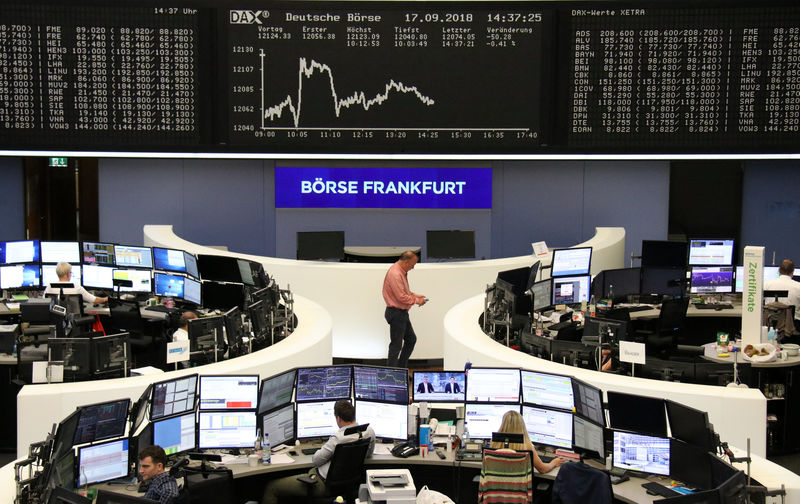LONDON (Reuters) - Who's afraid of the big bad trade war? Not world stock markets it seems.
The response to U.S. President Donald Trump’s decision to go ahead next week with collecting 10 percent tariffs on another $200 billion of Chinese goods, ratcheting up to 25 percent in January, was unusual and unexpected on Tuesday.
It initially hit U.S. stocks, Treasuries and the dollar while stirring a rally in Chinese equities (SS) and the yuan.
China then confirmed it would retaliate but still traders refused to flinch.
European stocks inched toward a third day of gains, futures pointed to a rebuond from Wall Street (ESc1) (N) and even copper and the Aussie dollar
"In a way it is remarkable that the market is holding up so well," said Rabobank's Head of Macro Strategy Elwin de Groot.
"This is clearly a further ratcheting up of the trade war and we are now getting close to a situation where you can almost speak of a full-fledged trade war. Clearly that is not positive."
One theory for the becalmed reaction was that the $200 billion U.S. move had been largely priced in to markets following weeks of reports and social media speculation.
Chinese shares had initially dipped as Asia digested the details but then rallied to the point where the blue-chip CSI index (CSI300) closed up 2 percent. Some locals were betting that Beijing will step up infrastructure investment to keep the economy humming.
Japan's Nikkei (N225) also ended 1.4 percent higher and MSCI's 24-country emerging market index was up for the fourth day in the last five as 1 percent gains in Poland (WIG20), Russia (IRTS) and Turkey (XU100) added to Asia's rebound.
Trump's announcement "is largely consistent with the claims made earlier," Citi analysts said in a note, estimating a 33 basis point drag on China's economic growth from the 10 percent tariff.
Dutch bank ING, meanwhile, estimated that 2.5 percent of world trade was now affected by the tariffs and will be 4 percent if Trump carries out a threat to put them on the remainder of Chinese imports unless Beijing meets his demands.
"Although this percentage may seem small, the tariffs will disrupt Sino-American supply chains, and may, therefore, triple the effects on world trade," ING warned.
LIQUIDATING SHORTS
China's promise to respond to the new U.S. tariffs also came as The South China Morning Post newspaper reported Beijing was reviewing plans to send a delegation headed by Vice Premier Liu He to Washington for trade talks.
Foreign Ministry spokesman Geng Shuang told a daily news briefing later that the U.S. steps had brought "new uncertainty" to talks between the two countries.
"China has always emphasized that the only correct way to resolve the China-U.S. trade issue is via talks and consultations held on an equal, sincere and mutually respectful basis. But at this time, everything the United States does not give the impression of sincerity or goodwill," he added.
In currencies, the dollar was broadly flat at 94.438 (DXY) although on an individual basis it was a fraction firmer against the Japanese yen at just shy of 112
At the same time it was down slightly against the Chinese yuan in 'offshore' markets
With FX participants wary that Beijing authorities may quickly step in to markets at any point, investors were "spontaneously" liquidating their short yuan positions said a trader at one Chinese bank.
"China is likely to reject the invitation from the U.S. Treasury for the new round of trade talk," OCBC Bank also said in a note on Tuesday.
Oil prices fell on worries rising trade tensions could dent global demand for crude.
U.S. crude futures (CLc1) fell 21 cents to $68.70 a barrel while international benchmark Brent futures (LCOc1) lost 35 cents to $77.70 per barrel.

Gold was weaker too, with spot prices